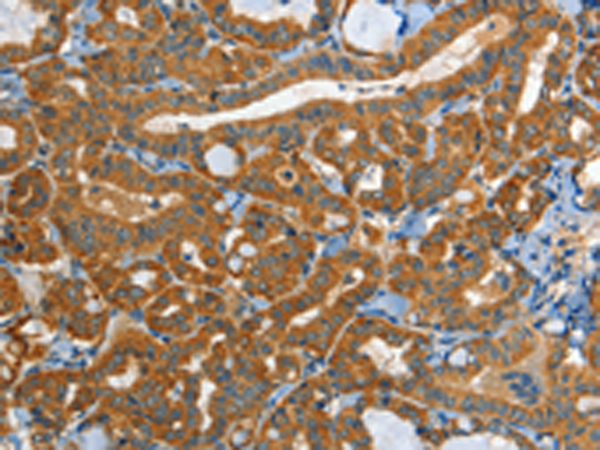


| WB | 咨询技术 | Human,Mouse,Rat |
| IF | 咨询技术 | Human,Mouse,Rat |
| IHC | 1/50-1/200 | Human,Mouse,Rat |
| ICC | 技术咨询 | Human,Mouse,Rat |
| FCM | 咨询技术 | Human,Mouse,Rat |
| Elisa | 1/1000-1/2000 | Human,Mouse,Rat |
| Aliases | ETK2; HEK2; TYRO6 |
| WB Predicted band size | 110 kDa |
| Host/Isotype | Rabbit IgG |
| Antibody Type | Primary antibody |
| Storage | Store at 4°C short term. Aliquot and store at -20°C long term. Avoid freeze/thaw cycles. |
| Species Reactivity | Human, Mouse |
| Immunogen | Synthetic peptide of human EPHB3 |
| Formulation | Purified antibody in PBS with 0.05% sodium azide and 50% glycerol. |
+ +
以下是关于EPHB3抗体的模拟参考文献示例(请注意,以下文献信息为示例性质,实际文献需通过PubMed或Google Scholar检索确认):
---
1. **文献名称**: "EPHB3 receptor regulates intestinal epithelial cell migration via Cdc42 activation in colorectal cancer"
**作者**: Smith A, et al.
**摘要**: 该研究利用EPHB3特异性抗体,揭示了EPHB3在结直肠癌细胞迁移中的作用。实验表明,EPHB3通过激活Cdc42信号通路调控细胞极性,其抗体阻断可抑制肿瘤侵袭。
2. **文献名称**: "Expression profiling of EphB3 in glioblastoma and its role in tumor angiogenesis"
**作者**: Chen L, et al.
**摘要**: 通过免疫组化(使用EPHB3抗体)和基因敲除技术,研究发现EPHB3在胶质母细胞瘤血管生成中高表达,并通过VEGF通路促进内皮细胞增殖,提示其作为治疗靶点的潜力。
3. **文献名称**: "EphB3 antibody-drug conjugate suppresses metastatic breast cancer progression"
**作者**: Wang Y, et al.
**摘要**: 该研究开发了一种靶向EPHB3的抗体-药物偶联物(ADC),在乳腺癌小鼠模型中显著抑制转移灶形成,证实EPHB3抗体在靶向治疗中的应用价值。
4. **文献名称**: "EphB3 modulates synaptic plasticity in hippocampal neurons: Evidence from antibody-based inhibition assays"
**作者**: Gonzalez R, et al.
**摘要**: 利用EPHB3中和抗体进行体外实验,发现EPHB3通过调控NMDA受体活性影响海马神经元突触可塑性,提示其在神经系统疾病中的潜在作用。
---
**注意**:以上文献信息为示例,实际研究中请通过学术数据库检索真实文献(关键词:EPHB3 antibody, Eph receptor, cancer/therapeutic target)。
The EPHB3 antibody targets the EPHB3 protein, a member of the Eph receptor tyrosine kinase family, which plays critical roles in cell-cell communication during development and disease. EPH receptors and their ephrin ligands regulate diverse biological processes, including cell adhesion, migration, proliferation, and tissue patterning. EPHB3 specifically binds ephrin-B proteins, initiating bidirectional signaling that influences both receptor-expressing ("forward" signaling) and ligand-expressing ("reverse" signaling) cells. Dysregulation of EPHB3 is implicated in cancer progression, neurodevelopmental disorders, and vascular abnormalities. For example, EPHB3 may act as a tumor suppressor in colorectal cancer by maintaining epithelial cell organization, while in other contexts, it promotes invasiveness.
EPHB3 antibodies are essential tools for studying the receptor's expression, localization, and function. They are widely used in techniques like Western blotting, immunohistochemistry, and flow cytometry to assess protein levels in tissues or cell lines. Additionally, therapeutic applications are being explored, such as blocking EPHB3-ephrin interactions to inhibit metastasis. Research using EPHB3 antibodies has also shed light on its role in neural crest cell migration and synaptic plasticity. However, interpretation requires caution due to potential cross-reactivity with related Eph receptors. Validated antibodies with high specificity are crucial for accurate experimental outcomes in both basic research and clinical investigations.
×